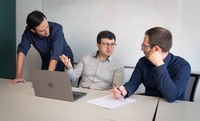New Cross Research Group to address societal challenges
The project to create a new kind of research structure was laid down a few years ago by Idiap’s management. The idea was to reinforce the institute’s ability to foster collaborations, while in-creasing technology transfer and impact on society. Incorporated in Idiap’s Research Program 2021-2024, Cross Research Groups (CRG) were approved and initiated in 2022. We met with the three researchers heading the first CRGs: Andre Freitas, leading the Neuro-Symbolic Learning & Reasoning group, Sébastien Marcel, leading the AI for Trust group, and Emmanuel Senft, leading the Human-Centered Robotics & AI group.
What is the specific aim of your group and how did you came up with this approach?
Andre Freitas (AF): Developing models which are capable of more efficient and transparent learning over small and heterogeneous data emerged as a strategic priority within the institute’s future vision of doing more with less. The Neuro-symbolic Learning & Reasoning CRG was created to reflect this strategic theme: to integrate the flexibility of neural-based models with the interpretability and control of symbolic systems. Merging these two properties is fundamental to enable contemporary neural-based models such as ChatGPT to be safely adapted and transferred to an industrial setting.
Emmanuel Senft (ES): With my background in robotics, I have a very similar perspective. My research field is inherently multidisciplinary, so I could witness the needs for connecting several technical expertise. For example, robots can be used to provide therapies, but these applications need advances in computer vision and language processing which are not within my expertise. In addition, we also need to collaborate tightly with therapists and doctors. Including other scientists in the domain of AI and the users of our technology helps to come up with new solutions in robotics or other fields. Therefore, with my multidisciplinary approach, when I saw the opening for the CRG position, I was keen to apply.
Sébastien Marcel (SM): Already having a research group on biometrics security and privacy, I must stress that the AI4Trust CRG will go beyond just biometrics to address emerging threats with AI by providing tools to increase trust. I took inspiration from our internal symposium where I stressed the need to address current and future social challenges, such as threats that will result from the climate change, energy shortages, and planetary boundaries. For example, we can mention the current need to tackle disinformation, fraud, blackmail, defamation by detecting deepfakes or automatically generated text contents, like ChatGPT, and in the future to address trafficking, business intelligence, forensics, national security and humanitarian support. This illustrates the role of collaborative approaches involving numerous multifaceted scientific and technical backgrounds.
In this regard, how do you intend to position your CRG in comparison to a classic research group?
SM: In my opinion, CRGs are like hubs in specific impact areas. We are complementary elements to Idiap’s technology transfer office, as we offer a very broad approach. CRGs involve other research groups.
ES: I agree. CRGs will go beyond answering isolated technical needs. We will bring more to projects thanks to multidisciplinary research perspectives. A good example of this approach potential is the collaboration with the Musée de la main in Lausanne. Several groups are responding together to the museum’s needs related to scientific education.
AF: In addition to these elements, I also think that CRGs will improve the strategic cohesion of the institute to address bigger research challenges.
About contributions, what kind of results do you expect for your CRG?
AF: Part of the aim behind CRGs is to integrate research inside and outside the institute. We expect that this can catalyze the number of collaborative projects and maximize the impact on long-term strategic themes.
SM: In parallel to that long term impact, I also expect to have a very pragmatic approach, aligned with our group-level resources. The aim is to address immediate needs, and, at the same time, we must be very proactive to create new tools. It may be an opportunity for Idiap to establish a new software framework as famous as Torch [editor’s note: the library developed at Idiap that laid down the ground for many AI based tools], who knows?
ES: These efforts will also increase Idiap’s visibility. I am looking forward to having new projects with external partners and other Idiap researchers. We also must keep in mind that CRGs are still in the making. The recruitment for a fourth group is still open.
More information
- Idiap Research Program 2021-2024
- AI for Trust, led by Prof. Sébastien Marcel
- Human-Centered Robotics & AI, led by Dr. Emmanuel Senft
- Neuro-Symbolic AI, led by Dr. Andre Freitas
